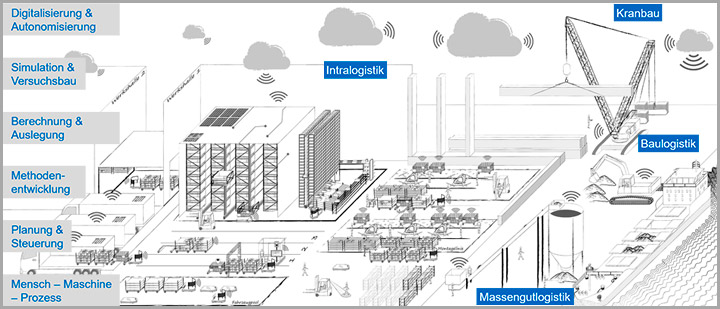Chair of Materials Handling, Material Flow, Logistics
The Chair of Materials Handling, Material Flow, Logistics (fml) sees itself as an open research institution, which wants to contribute significantly to scientific progress in the fields of material flow technology and logistics. The research activities focus on intralogistics, crane construction, construction logistics and bulk goods logistics.
The chair fml focuses on holistic approaches: For many years, the core competencies of the chair have included the development of analytical and simulative calculation and design tools as well as the development and implementation of digital planning methods and innovative control strategies in all areas of logistics. Current challenges in the areas of digitization, identification and automation are as much a subject of research as the intelligent interaction of man, machine and process.
For their research and development work, the approx. 50 scientific staff and employees as well as a large number of student employees have at their disposal not only office workstations, but also the teaching chair's own test hall as well as a test outdoor area. The in-house capacities for test and prototype construction in the chair workshop provide ideal conditions for the short-term, practical and application-oriented implementation of research results.
Continuous knowledge transfer and problem-specific knowledge adaptation are just as much a part of the core tasks of the chair as the training of young scientists through dedicated teaching activities. With the help of the knowledge gained and its practical transfer, especially to small and medium-sized enterprises (SMEs), an important contribution is made to securing Germany as a logistics location.
Furthermore, the knowledge gained in basic research forms the basis for the development of innovative solutions to current and practice-relevant questions from science and industry.
The fml chair is involved in basic research and applied research financed by public institutions as well as in research cooperations with industrial partners. Research is usually carried out in interdisciplinary cooperation.
